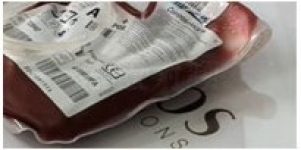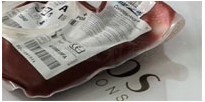
Application of RFID Scanner in Blood Bank Tracking
[ad_1]
It is by no means an easy task to quickly find what you want in 30,000 blood bags, especially when you have to scan barcodes manually in a cold storage at -35°C.
When a study revealed that RFID would reduce costs and improve security, the Spanish Balearic Islands Blood Tissue Bank sought to purchase RFID systems from Aifos Solutions, a company headquartered in Barcelona, and from Finland’s Nordic ID company for purchases in Asia. Hand-held reader that works in arctic temperatures.
Problems with barcode scanning of blood bags
So far, barcode scanning means opening the frozen blood bag packaging box. There are 30,000 bags in the cold storage, each 80 bags a box, each bag has to scan and read up to 6 labels, which is not a simple matter. It takes a long time to find the required blood bag. Workers often move the boxes outside the cold storage to find them. At this time, the plasma is at risk of melting. After the blood is drawn from the blood donor on the blood donation cart in the Balearic Islands, the blood transportation process is very complicated, and 6 barcodes are needed to ensure that the red blood cells, plasma or platelets reach the patients who need blood perfectly. In addition, when the hospital sends blood parameters, the blood bank must respond as quickly as possible.

RFID makes blood tracking faster, safer and cheaper
In order to make the blood tracking and positioning process faster, safer and more transparent, the Balearic Islands Blood Tissue Bank chose Barcelona-based RFID system expert Aifos Solutions to help them transition from barcode to RFID. Aifos chose Nordic ID’s PL 3000 UHF portable RFID scanner to find the blood bags needed by the staff. The new RFID tag stores all the information, including records of changes in ambient temperature over time. These records are stored on a 512-bit RFID tag that can be re-recorded on the bag. The staff is equipped with a Nordic ID scanner, which can scan up to 400 tags per second, can quickly find the required blood bag, and carefully check all the information related to the tags.
Esteve Jané, Director of Operations at Aifos Solutions, said: “Once the entire project is launched in August 2010, the system we developed will quickly play a role in reducing operating costs and recovering the investment. Since the ID of the blood donor cannot be erased, only those who have Only those with the correct password can access other memory sticks, so the security is greatly improved.
NORDIC ID’s products are great, service is good, and reliability is high
For Aifos, it is a new cooperative relationship with Nordic ID. This company was selected on the basis of equipment testing and for strategic reasons. Esteve Jane said: “To be honest, one of the reasons we chose Nordic ID is because they are from Finland. This project is very important to Aifos, and we can’t afford equipment orders and service problems. When a Finnish company says that the order will be in ten Arrived within days, you can expect the equipment to arrive in the afternoon of the ninth day.”
In addition to the light weight of this portable scanner, it can be charged for a whole day at a time, and can work at 35°C. What Aifos company most appreciates is the service of Nordic ID company. Jane said: “At first we needed to know whether this scanner can work at sub-arctic temperatures. None of the companies we contacted has tested this. However, the service staff of Nordic ID did an investigation and explained to us that the PL3000 is technically It can be suitable for such a temperature environment. This is convenient for us, and since then, their service has been top-notch.”
[ad_2]



